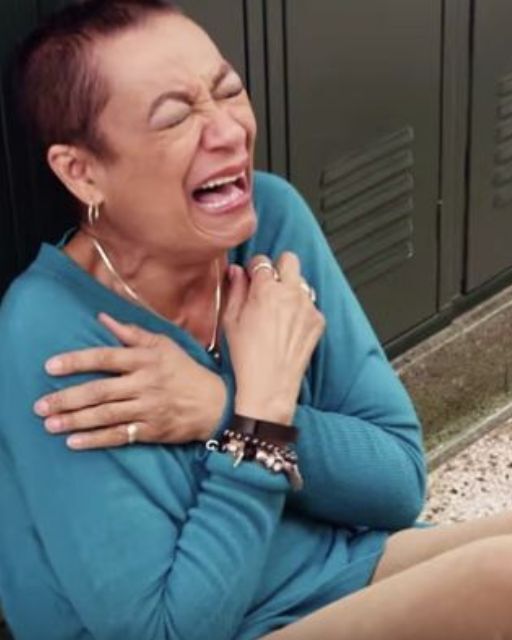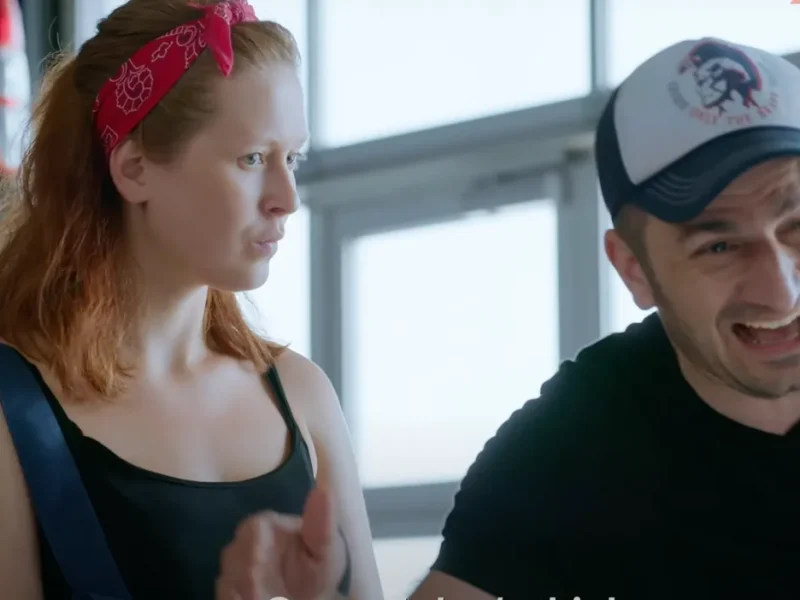She thought she was just picking up paperwork.
That’s what the school secretary had said. “Swing by after lunch—just a few forms to sign. Nothing big.”
She almost didn’t go.
It had been months since she left—months of cancer treatments, of aching bones and quiet battles fought in hospital gowns instead of classrooms. The thought of walking through those halls—her halls—without the strength to teach felt like reopening a wound she was barely starting to heal.
Still, something nudged her.
So she came.
And when she turned the corner toward her old hallway, she froze.
They were there.
Dozens of former students, shoulder to shoulder. Some in college sweatshirts. Some holding toddlers. Some holding signs. Some holding back tears.
A giant banner stretched across the lockers:
Welcome Home, Ms. Carter.
Someone had recreated her old bulletin board. Another had brought her favorite lavender tea. Bouquets lined the lockers. A circle of chairs waited like a classroom reborn.
Then came the music.
A voice rose from the crowd—one of her old theater kids, now a music major. The opening notes of their song—the one from the school play five years ago—echoed down the hall. One by one, others joined in.
And Ms. Carter collapsed to her knees—not from weakness, but from sheer, breathtaking emotion.
Because in that moment, she realized something:
They hadn’t just learned literature, or grammar, or how to write a thesis statement.
They had learned how to show up.
She sat on the cold floor, tears streaming freely now, as the faces she once guided came into focus. The quiet ones. The restless ones. The ones who doubted themselves. The ones she stayed late for, worried over, believed in when they couldn’t believe in themselves.
They were here.
And they remembered.
“Ms. Carter,” came a soft voice. It was Jessie, once one of her most difficult students—brilliant but unsure, hidden behind silence and insecurity.
Now Jessie stood taller, a bouquet of wildflowers in her hands.
“You okay?” she asked gently.
Ms. Carter smiled through her tears. “Just… overwhelmed.”
Jessie’s voice didn’t waver. “You taught us to show up. This is us showing up for you.”
Then Tom stepped forward. A former tutoring regular who used to freeze on math tests, now wearing a college hoodie with pride. “You didn’t give up on me, even when I wanted to give up on myself.”
And Sarah—oh, Sarah. The first student who ever came to her about family troubles, who used to stay after class just to feel safe. “I’m a nurse now,” she said through a watery smile. “Because you showed me how to care. Really care.”
Ms. Carter’s heart cracked open in the best way. These were the moments no paycheck could ever measure. These were the souls she’d helped shape.
And then, a shift.
Mr. Rogers, the principal, stepped from the crowd. He was calm but solemn.
“I’m glad you’re here,” he said softly. “But there’s something we need to talk about.”
The hallway fell quiet.
“There have been budget cuts,” he continued. “The board voted to eliminate several arts programs—including the English department. Your position… your legacy—it’s on the chopping block.”
Gasps. Then silence.
Ms. Carter’s heart sank. Of all days…
But before she could speak, Tom’s voice rose again—stronger now. “We’re not letting that happen.”
Jessie stepped forward. “You showed up for us. Now it’s our turn.”
A ripple turned into a wave.
“You taught us that school is more than grades,” Sarah added. “It’s about being seen. Being believed in. That doesn’t fit in a budget line, but it matters.”
The students organized.
They launched petitions. Spoke at school board meetings. Shared stories online that went viral. Alumni from across the country sent letters, recorded videos, donated money.
And they won.
The board reversed its decision. The English department was saved. Ms. Carter’s classroom—her sanctuary—remained open.
But more than that?
Her students had become advocates. Doers. Healers. Fighters. Not just because of what she taught—but because of who she had been to them.
Ms. Carter didn’t just come back to sign papers that day.
She came back to see, for the first time, the full impact of a life spent quietly shaping others.
And what her students showed her is what she’d spent her whole career showing them:
That showing up isn’t a small thing.
It’s everything.
So if you’ve ever been changed by a teacher—or anyone who believed in you before you believed in yourself—share this story.
Let it remind you:
The most powerful lessons aren’t found in textbooks.
They’re found in the people who never stopped showing up.


